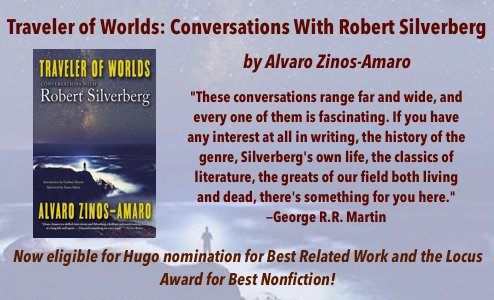Alvaro is co-author, with Robert Silverberg, of When The Blue Shift Comes and Traveler of Worlds: Conversations with Robert Silverberg, which is currently eligible for Hugo nomination in the Best Related category and the Locus Award for best non-fiction.
Alvaro’s more than thirty stories have appeared in magazines like Analog, Nature, Lightspeed, Galaxy’s Edge, Lackington’s, Farrago’s Wainscot and Neon, as well as anthologies such as The Mammoth Book of the Adventures of Moriarty, The Mammoth Book of Jack the Ripper Tales, The 2015 Young Explorer’s Adventure Guide, Cyber World, This Way to the End Times, Humanity 2.0, An Alphabet of Embers and The Year’s Best Science Fiction & Fantasy 2016. Alvaro’s essays, reviews and interviews have appeared in The Los Angeles Review of Books, The First Line, Asimov’s, Tor.com, Strange Horizons, Clarkesworld, Foundation, The New York Review of Science Fiction and Intergalactic Medicine Show. He also edits the roundtable blog for Locus.
If I’d had the chance to pursue a book of interviews with Robert Silverberg ten or even five years ago, I wouldn’t have done it.
For one, it was Bob’s positive response to my half of When the Blue Shift Comes (2012), our collaborative fiction project, that inspired in him the willingness to indulge my curiosity on the record.
But more importantly, even if Bob had been receptive to the notion of an interview book prior to Blue Shift, I wouldn’t have felt comfortable with the prospect. Despite my knowledge of his work, I didn’t have much experience interviewing people, and I felt that no matter how helpful he was throughout the process, I’d need a minimum of interview practice to keep it from being amateurish.
Perhaps my earliest significant interview of a s/f/h writer was one I conducted with Robert Reed. It was noteworthy because it was face-to-face in Robert Reed’s natural environs of Lincoln, Nebraska, and it was also a milestone because it was probably the first interview that paid me anything (it appeared in the Internet Review of Science Fiction, August 2009). In some ways, though, it felt like an anomaly. The interview took place over several days, in different locations, and Mr. Reed was extremely patient. I’d also had enormous lead time to prepare, and had performed abundant research. I didn’t imagine most interviews were like that–but I wasn’t sure what they were like.
I decided practice would be my teacher. I interviewed a number of great people for SF Signal, and those pieces turned out fine. They were all conducted by email, though, and again I wondered if I’d have the ability to adapt to other means of communication. Also, I had chosen my subjects. What techniques to employ if you were assigned someone to interview, maybe someone whose work you didn’t know very well?
An opportunity opened up for interviews at Clarkesworld in 2014 and I grabbed it. Over the next year I did eight interviews for Clarkesworld, and this was where I finally felt like I’d gained insight and hit on principles I could apply in the future. Some of these interviews were done by phone, some by Skype, some by email, and they represented a range of authors and editors. The experience proved invaluable. (Many thanks to Kate Baker, for her guidance and words of wisdom throughout).
Here, in condensed form, were some of my takeaways (keep in mind, these are things that work for me, not claims to universal truth):
1) A blend of specific and general questions tends to work best. Sometimes authors can be remarkably succinct in responding to a broad question, and sometimes a finely-honed observation can unlatch a whole series of comments they’ve been wanting to make. It’s hard to tell which call will produce which response until you try.
2) It’s important to listen to cues in tone and be willing to follow spontaneous developments. Some may turn out to be tangents, but some may lead to places more interesting than any pre-planned route.
3) Better to have more material than not enough; have back-up questions ready.
4) Read previous interviews with the author. It’s a fun way to learn about them, it may suggest what approach is best-suited to their personality (assuming it’s a good interview—but painful ones can be equally instructive, in what to avoid), and it may lead you to scratch out a question or two (because they are always asked those questions) or spark ideas for follow-ups.
5) One of my favorites: Consider what others—artists, philosophers, writers, mathematicians, etc.—have said about a particular topic, and feel free to quote them. An interviewee doesn’t necessarily have to respond to the specific ideas of an interviewer; the interviewer can act as an organizing conduit that channels interesting material and brings it to the interviewee for consideration.
6) It’s common courtesy to provide the author with final proofs of the interview and ask for his or her approval/confirmation.
In the conversations that inform Traveler of Worlds (2016), I relied on all of the above. I may have gotten away without the practice and the techniques it engendered, but by internalizing them I was able to relax and enjoy the experience.
At the end of the day, that may be more critical than it seems. Removing obstacles, particularly self-made ones like lack of confidence or anxiety, from the interviewer can be just as important as putting the interviewee at ease and making him or her feel they are in a safe environment. And I believe that it comes across in the finished product, too. When the interviewer isn’t sold on his or her questions, it’s hard to convince the reader that the answers, no matter how brilliant, really matter.


0 Comments